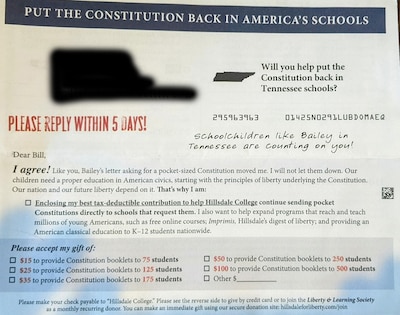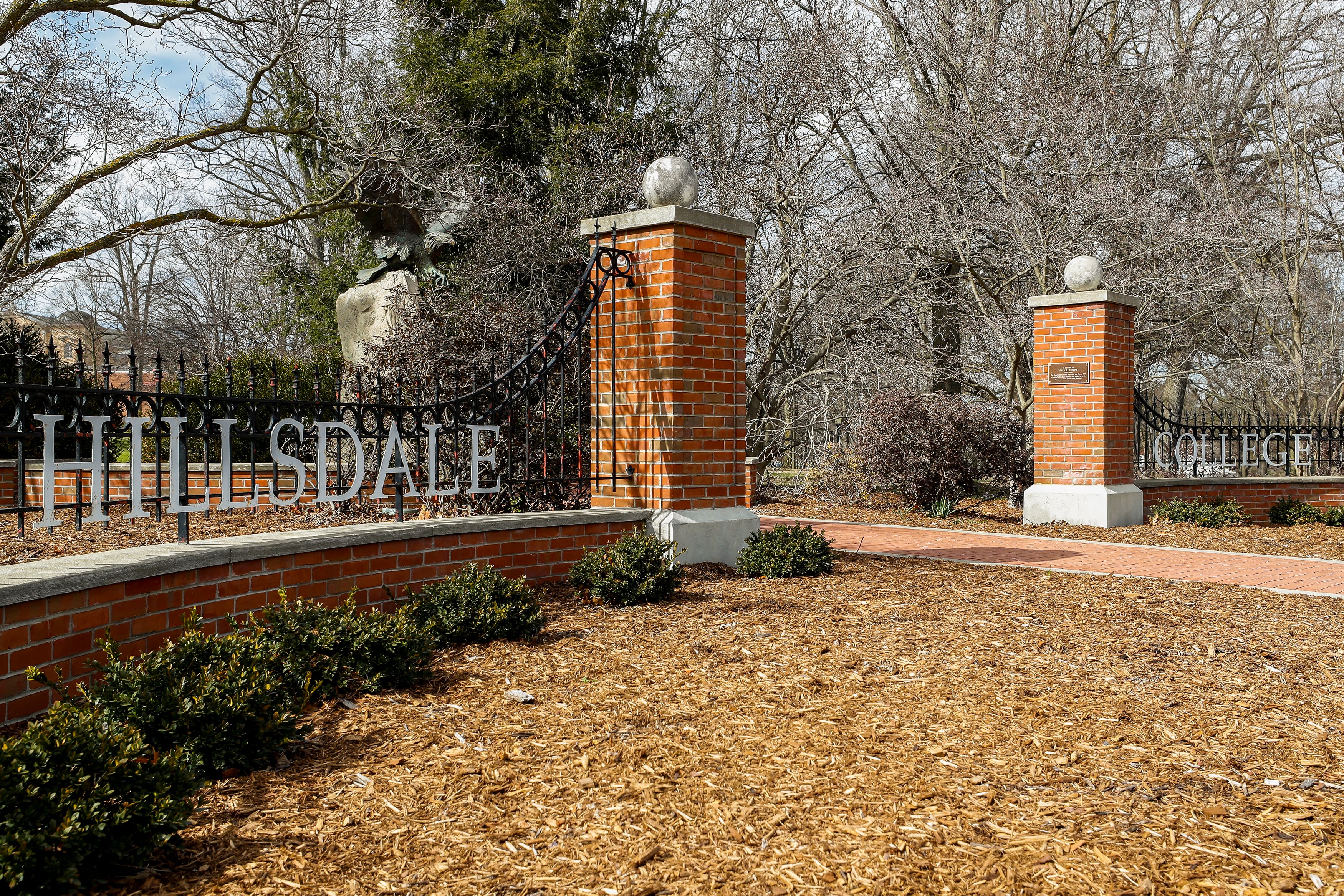Sign up for Chalkbeat Tennessee’s free daily newsletter to keep up with statewide education policy and Memphis-Shelby County Schools.
A conservative Christian college involved in classroom culture wars is suggesting that the U.S. Constitution is absent from Tennessee schools, drawing a public rebuke from a member of a Republican-appointed committee that developed the state’s social studies standards.
A recent mailer from Hillsdale College in Michigan warns that K-12 education is at a crisis point. “Activists and bureaucrats,” it reads, are pushing to “replace individual rights with the destructive idea of unequal rights based on identity using critical race theory and other Marxist ideologies.”

The mailer solicits tax-deductible donations ranging from $15 to $100 to help the college continue to send pocket-sized copies of the Constitution to schools that request them.
“Will you help put the Constitution back in Tennessee schools?” it reads in bold print.
But according to the state’s social studies standards, which lay out what students should know at each grade level, the Constitution has a prominent place in Tennessee schools.
Students are expected to be introduced to the Constitution in second grade. By fourth grade, students are to examine constitutional principles such as the separation of powers, federalism, and checks and balances. Three constitutional amendments are covered in eighth grade.
The mailer isn’t sitting well with two former social studies standards committee members and others who advocate for the subject and develop resources for educators to teach it well.
“When you see a flier like this, you realize that a lot of people believe it. If something goes uncontested, people believe it,” said Bill Carey, executive director of Tennessee History for Kids, a nonprofit that produces resources for educators on state history. “It’s not true, obviously. Tennessee may do a better job of any state at teaching civics and the U.S. Constitution.”
Carey, who served on a 10-member committee that revised the standards in 2016 and 2017, voiced his criticism in an opinion piece published in newspapers across Tennessee. He received the mailer at his suburban Nashville home and shared a copy with Chalkbeat.
Asked to comment on Carey’s op-ed, a Hillsdale representative said the college’s main concern is curriculum, or the lessons and instruction students get to learn material in the standards.
“Despite the best intentions of good, even excellent, state standards, some teachers and administrators can and do deviate from them,” said Labin Duke, the school’s associate vice president of national donor outreach, in a written response. “Recent legislation in Tennessee aimed at restricting inappropriate materials in schools suggests as much.”
Duke did not cite evidence of schools or teachers deviating from Tennessee’s social studies standards.
In 2021, Tennessee became one the first states to adopt a law restricting what educators can teach about race, gender, bias, and other concepts. The law has led teachers to exercise caution when teaching about school segregation and raised concerns about a chilling effect on authors speaking to Memphis high schoolers about their book on George Floyd’s death.
William “Freddy” Curtis, a retired government and civics educator who also served on the 2016-17 social studies standards committee, agreed that social studies gets short shrift nationally but took umbrage at Hillsdale’s characterization of what’s happening in Tennessee.
The committee, which he vice-chaired, added standards about the history and application of the Constitution, he said. He does not think deviating from standards is a problem in Tennessee, citing as evidence a requirement that districts give every high school student a civics exam.
Curtis was an elementary school teacher, high-school government teacher, principal, and district superintendent in Cannon County, a rural area between Chattanooga and Nashville. He’s also a self-described conservative, Republican primary voter, and ordained Church of God minister who served as an adviser on Republican Gov. Bill Lee’s first gubernatorial campaign.
“To be told I am a Marxist activist … I didn’t like that at all,” Curtis said. “I am probably a proponent of some of the things Hillsdale does. But this is so crazy, it’s off the charts.”
He added: “A lot of teachers are conservatives, particularly in Tennessee.”
Kira Duke, state coordinator for the Tennessee Council for History Education, which promotes the importance of history and supports teachers, said Tennessee’s social studies standards are fairly specific about what to teach about the Constitution compared to other states.
For example, she said, “North Carolina standards are written to be broad, to address more themes, and you can make an argument there is a place for that.”
Hillsdale has gained a higher national profile in recent years for championing a classical liberal arts education, including pushing to expand its affiliated charter schools in Tennessee. The mailer appears to use boilerplate language that could be sent anywhere in the country, and it states that donations may go to other causes along with pocket Constitutions.
Mark Finchum, executive director of the Tennessee Council for Social Studies and a former National Council for Social Studies board member, said the mailer uses scare tactics.
“I don’t really care for propaganda,” Finchum said. “Words are so important, and we need to choose them carefully.”
Duke, of Hillsdale, said in the statement that the mailer “simply aims to support educators who want all students to meet Tennessee’s high standards.” The college has distributed more than 5 million free copies of the Declaration of Independence and the U.S. Constitution, including more than 700,000 to teachers and students nationwide, he said.
Carey said students need context, not just copies of primary source material. He pointed to a number of ways the country’s seminal document is being taught in Tennessee, including with free online curriculum produced by the Secretary of State’s office.
When the committee was revising the standards a few years ago, members had sometimes heated debates on how to word standards that cover the origins of world religions, how to teach Tennessee history, and when students should learn about the Holocaust.
The U.S. Constitution, he said, was not a contentious topic.
Eric Gorski is a managing editor for local news. Reach Eric at egorski@chalkbeat.org .






